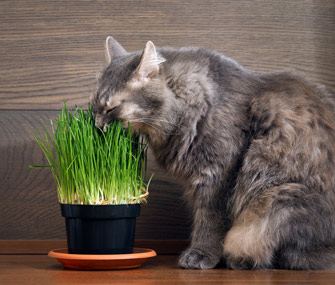Why Does My Cat… Eat Grass or Houseplants?
Published on September 21, 2016
Skip To

One theory is that when a cat is dealing with an underlying gastrointestinal disease, such as inflammatory bowel disease or food allergies, eating grass may help her feel better. As we all know, gastrointestinal disease can cause discomfort, whether it is pain in the stomach or intestines, and it can be difficult to bear. Sometimes it can be hard to tell exactly where the discomfort is coming from. I personally have had days where I didn’t know whether I was suffering from hunger pangs and should eat something, or if the pain was due to an upset and I needed to reach for the Tums to soothe my stomach. For a cat, eating grass may be her way of trying to alleviate any discomfort she may feel. The grass may either provide some material to fill up the stomach or, in some cases, induce vomiting to try to eliminate something in the stomach that is making the cat feel ill.
Another theory is that eating grass may provide some nutrients that your cat needs or that it may provide a necessary step that aids in gastrointestinal health. Grass is a natural fiber that may help with gastrointestinal motility. Even though cats are obligate carnivores (meaning they only eat meat) some researchers suggest that eating plant material may provide trace elements or vitamins that may be missing in their diet. Another possibility is that your cat is one of those felines who thinks she is starving all the time! If your cat feels hungry, she may simply be seeking other items to ingest and grass or plants may be some handy items.
Some people also think eating grass may possibly help reduce a cat’s intestinal parasite load. Whether this is affected by the grass fibers mechanically entrapping some worms by intertwining with them as the plant material moves through the intestinal tract or by inducing the cat to vomit them up is not known. Researchers have certainly found intestinal parasites wrapped around blades of grass in the scat of wolves. Other researchers think that it may just be part of some cats’ normal behavior patterns to eat grass, just as some people have a preference for certain foods.
A cat that constantly eats grass or plants also may be exhibiting signs of a displacement behavior. This occurs when your cat is trying to cope with stressors in her life. What may cause your cat to be stressed? She may be genetically predisposed to experiencing anxiety, but in many cases a lack of early socialization or exposure to early negative experiences can also contribute to the development of an anxiety disorder. To cope, some cats may exhibit over-grooming or excessive vocalization when they are anxious, while other cats may try to engage in a different activity to soothe themselves, such as finding something to chew on. Indoor-only cats may not have access to grass so they may chew on household plants instead. (If your cat exhibits this behavior, you need to make sure that the plants you have in your household are non-toxic for your cat.)
Other cats may appear to have an oral fixation where they “like” to chew on things, such as blankets, strings, shoelaces, electrical cords or plants. These cats may start chewing and once the material gets in the back of their mouth, their only recourse is to swallow. They cannot stop halfway and spit the item out.
What to do if your cat exhibits this behavior? If your cat occasionally eats grass and vomits, I would not be too worried. If your cat exhibits this behavior daily, several times a day or several days of the week, then please have your cat examined by your veterinarian and make sure a medical work-up has eliminated a medical problem. If your cat exhibits anxious behavior, work with your veterinarian to determine the triggers for the anxiety and together develop a plan to alleviate them (as well as preventing access to items that might be dangerous to chew). Sometimes providing a diet higher in fiber or giving your cat other behaviors to focus on, such as teaching her to do some simple tricks through clicker training or keeping her busy with food puzzles that engage her and slow down her pace of eating can be helpful.
Finally, be aware that if your cat is accessing and eating grass outside and not from indoor houseplants or grass gardens, he or she may be at greater risk of being exposed to pesticides or herbicide in your yard or in your neighbor’s yard. There is also a potential risk of contracting internal parasites. Please consult your veterinarian to discuss any possible risks to your cat.
More on Vetstreet:
- Teach Your Cat to Walk on a Leash
- 4 Odd Cat Sleeping Habits Explained
- 5 Common Cat Behavior Myths Debunked
- Why Some Cats Eat Food Away From Their Bowl
- 4 Ways You Might Be Misinterpreting Your Cat’s Body Language





